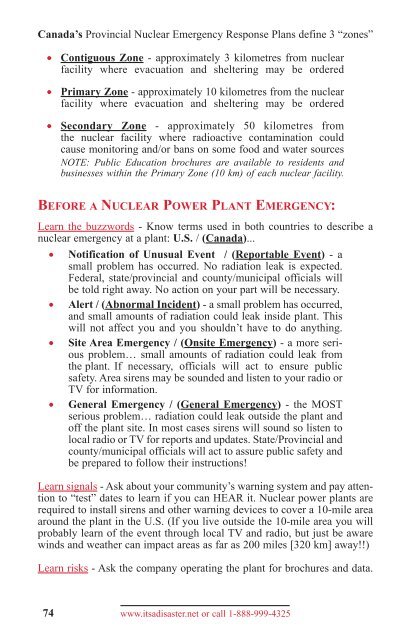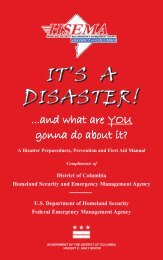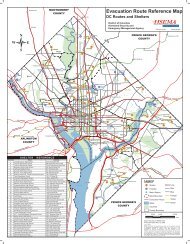disaster 5th 1108_5th ed 2011 - Homeland Security and Emergency ...
disaster 5th 1108_5th ed 2011 - Homeland Security and Emergency ...
disaster 5th 1108_5th ed 2011 - Homeland Security and Emergency ...
Create successful ePaper yourself
Turn your PDF publications into a flip-book with our unique Google optimized e-Paper software.
Canada’s Provincial Nuclear <strong>Emergency</strong> Response Plans define 3 “zones”<br />
• Contiguous Zone - approximately 3 kilometres from nuclear<br />
facility where evacuation <strong>and</strong> sheltering may be order<strong>ed</strong><br />
• Primary Zone - approximately 10 kilometres from the nuclear<br />
facility where evacuation <strong>and</strong> sheltering may be order<strong>ed</strong><br />
• Secondary Zone - approximately 50 kilometres from<br />
the nuclear facility where radioactive contamination could<br />
cause monitoring <strong>and</strong>/or bans on some food <strong>and</strong> water sources<br />
NOTE: Public Education brochures are available to residents <strong>and</strong><br />
businesses within the Primary Zone (10 km) of each nuclear facility.<br />
BEFORE A NUCLEAR POWER PLANT EMERGENCY:<br />
Learn the buzzwords - Know terms us<strong>ed</strong> in both countries to describe a<br />
nuclear emergency at a plant: U.S. / (Canada)...<br />
• Notification of Unusual Event / (Reportable Event) - a<br />
small problem has occurr<strong>ed</strong>. No radiation leak is expect<strong>ed</strong>.<br />
F<strong>ed</strong>eral, state/provincial <strong>and</strong> county/municipal officials will<br />
be told right away. No action on your part will be necessary.<br />
• Alert / (Abnormal Incident) - a small problem has occurr<strong>ed</strong>,<br />
<strong>and</strong> small amounts of radiation could leak inside plant. This<br />
will not affect you <strong>and</strong> you shouldn’t have to do anything.<br />
• Site Area <strong>Emergency</strong> / (Onsite <strong>Emergency</strong>) - a more serious<br />
problem… small amounts of radiation could leak from<br />
the plant. If necessary, officials will act to ensure public<br />
safety. Area sirens may be sound<strong>ed</strong> <strong>and</strong> listen to your radio or<br />
TV for information.<br />
• General <strong>Emergency</strong> / (General <strong>Emergency</strong>) - the MOST<br />
serious problem… radiation could leak outside the plant <strong>and</strong><br />
off the plant site. In most cases sirens will sound so listen to<br />
local radio or TV for reports <strong>and</strong> updates. State/Provincial <strong>and</strong><br />
county/municipal officials will act to assure public safety <strong>and</strong><br />
be prepar<strong>ed</strong> to follow their instructions!<br />
Learn signals - Ask about your community’s warning system <strong>and</strong> pay attention<br />
to “test” dates to learn if you can HEAR it. Nuclear power plants are<br />
requir<strong>ed</strong> to install sirens <strong>and</strong> other warning devices to cover a 10-mile area<br />
around the plant in the U.S. (If you live outside the 10-mile area you will<br />
probably learn of the event through local TV <strong>and</strong> radio, but just be aware<br />
winds <strong>and</strong> weather can impact areas as far as 200 miles [320 km] away!!)<br />
Learn risks - Ask the company operating the plant for brochures <strong>and</strong> data.<br />
74 www.itsa<strong>disaster</strong>.net or call 1-888-999-4325





